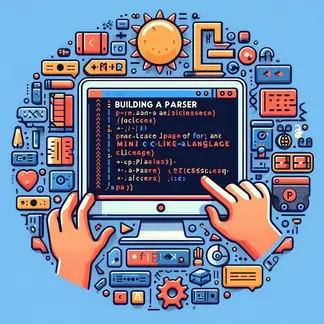Claim Your Offer
Unlock an amazing offer at www.programminghomeworkhelp.com with our latest promotion. Get an incredible 10% off on your all programming assignment, ensuring top-quality assistance at an affordable price. Our team of expert programmers is here to help you, making your academic journey smoother and more cost-effective. Don't miss this chance to improve your skills and save on your studies. Take advantage of our offer now and secure exceptional help for your programming assignments.
We Accept
- Understanding the Assignment Requirements
- Reviewing the Provided Grammar
- Understanding Parser Expectations
- Identifying the Provided Resources
- Implementing the Recursive-Descent Parser
- Structuring Parser Functions
- Handling Statement Parsing
- Handling Expressions and Operator Precedence
- Parsing Logical and Relational Expressions
- Handling Arithmetic Expressions
- Implementing Error Handling and Debugging
- Error Reporting Mechanisms
- Debugging Strategies
- Testing and Validation
- Running Provided Test Cases
- Edge Case Handling
- Conclusion
Developing a parser for a Mini C-Like Language (MCL) is an essential skill for students studying compilers and programming languages. These assignments help in understanding syntax analysis, parsing techniques, and how a programming language interprets its code. However, solving such assignments can be quite challenging, as they require a deep understanding of grammar rules, recursive-descent parsing, tokenization, and error handling. For students who find themselves stuck, searching for solutions with phrases like "do my programming assignment" is quite common. Understanding parsing and syntax analysis requires both theoretical knowledge and hands-on experience, which can sometimes be overwhelming. This is where guidance from an expert C Assignment Helper becomes invaluable. With the right support, students can learn how to break down complex problems, understand compiler construction, and write efficient parsers. Instead of struggling alone, reaching out for expert assistance ensures that assignments are completed accurately while also improving one’s programming skills. In this blog, we will take a structured approach to solving such assignments, ensuring that the concepts are not just theoretically understood but also practically implemented. We will cover various aspects such as understanding the problem statement, designing the parser, handling expressions and operator precedence, implementing error handling, and testing the parser to ensure it functions as expected.
Understanding the Assignment Requirements

Before diving into the coding process, it is crucial to grasp the assignment's expectations. Understanding the grammar, the role of different components, and how the provided files interact is essential for successfully implementing the parser.
Reviewing the Provided Grammar
Most assignments of this nature provide an Extended Backus-Naur Form (EBNF) grammar. This grammar dictates the structure of the Mini C-Like Language (MCL). A thorough review of the provided grammar will help in structuring the parser correctly. Key grammar components include:
- Program Structure: The parser typically starts parsing from a root production rule, such as Prog ::= PROGRAM IDENT CompStmt. This defines the main structure of the program.
- Statements: These include declaration statements, assignment statements, control flow statements (if, while, etc.), and compound statements enclosed within {}.
- Expressions and Operators: Handling arithmetic expressions, relational expressions, logical expressions, and ensuring proper precedence and associativity of operators.
Understanding Parser Expectations
The primary objective of an MCL parser is to:
- Read and process tokens generated by the lexical analyzer.
- Match tokens with grammar rules and build a parse tree.
- Detect syntax errors and provide meaningful error messages.
- Ensure correct precedence and associativity when parsing expressions.
- Handle compound statements and nested control structures correctly.
Identifying the Provided Resources
Many assignments come with partially implemented files or starter templates. These typically include:
- parser.h – Header file containing function declarations for parsing routines.
- GivenParserPart.cpp – A partially implemented parser file requiring completion.
- lex.h and lex.cpp – Lexical analyzer responsible for tokenization.
- prog2.cpp – A test driver to execute the parser.
Familiarizing yourself with these files will help you understand what has already been implemented and what needs to be completed.
Implementing the Recursive-Descent Parser
Once the grammar is clear, the next step is to implement the recursive-descent parser. This involves writing functions that correspond to the non-terminals in the grammar.
Structuring Parser Functions
Each non-terminal in the grammar should have a dedicated function in the parser. Commonly required functions include:
- Prog(): Parses the overall program structure.
- StmtList(): Parses a sequence of statements.
- Stmt(): Parses individual statements such as declarations, assignments, and control structures.
- Expr(): Parses expressions while ensuring correct precedence.
- CompStmt(): Handles compound statements enclosed within {}.
Handling Statement Parsing
Parsing Declaration Statements
Declaration statements define variables and assign them types. The parser must ensure proper syntax and type specification.
void DeclStmt() {
Token t = GetNextToken();
if (t != INT && t != FLOAT && t != BOOL && t != CHAR && t != STRING) {
ParserError("Invalid Declaration Statement.");
return;
}
VarList();
Expect(';');
}
Parsing If Statements
If-statements introduce conditional branching. The parser must ensure that conditions are enclosed in parentheses and statements follow correct syntax.
void IfStmt() {
Expect(IF);
Expect('(');
Expr();
Expect(')');
Stmt();
if (PeekToken() == ELSE) {
GetNextToken();
Stmt();
}
}
Parsing Compound Statements
Compound statements group multiple statements within curly braces.
void CompStmt() {
Expect('{');
StmtList();
Expect('}');
}
Handling Expressions and Operator Precedence
Expressions in MCL involve different precedence levels. Implementing a correct precedence parser ensures that expressions evaluate as expected.
Parsing Logical and Relational Expressions
Logical AND and OR
void LogANDExpr() {
EqualExpr();
while (PeekToken() == AND) {
GetNextToken();
EqualExpr();
}
}
Relational Operators
Relational operators define comparisons.
void RelExpr() {
AddExpr();
if (PeekToken() == '<' || PeekToken() == '>') {
GetNextToken();
AddExpr();
}
}
Handling Arithmetic Expressions
Addition and Subtraction
void AddExpr() {
MultExpr();
while (PeekToken() == '+' || PeekToken() == '-') {
GetNextToken();
MultExpr();
}
}
Multiplication, Division, and Modulus
void MultExpr() {
UnaryExpr();
while (PeekToken() == '*' || PeekToken() == '/' || PeekToken() == '%') {
GetNextToken();
UnaryExpr();
}
}
Implementing Error Handling and Debugging
A parser must detect syntax errors and report them effectively.
Error Reporting Mechanisms
Basic Error Reporting
void ParserError(string msg) {
cout << "Error at line " << lineNumber << ": " << msg << endl;
}
Detecting Missing Symbols
if (token != ';') {
ParserError("Missing semicolon at end of statement.");
}
Debugging Strategies
- Printing tokens while parsing helps track progress.
- Using test cases ensures correctness.
- Comparing expected vs. actual output identifies discrepancies.
Testing and Validation
Thorough testing ensures the parser functions correctly.
Running Provided Test Cases
A well-implemented parser should:
- Parse correct programs successfully.
- Detect syntax errors and provide informative messages.
Edge Case Handling
Consider scenarios such as:
- Nested if-statements.
- Incorrect operator usage.
- Missing delimiters.
Conclusion
Building a parser for a Mini C-Like Language is a complex but rewarding task. By analyzing grammar rules, implementing recursive-descent parsing, managing operator precedence, and handling errors effectively, you can create a robust parser. Testing thoroughly and debugging systematically will enhance its reliability. Mastering these skills prepares you for advanced compiler construction tasks in the future.









